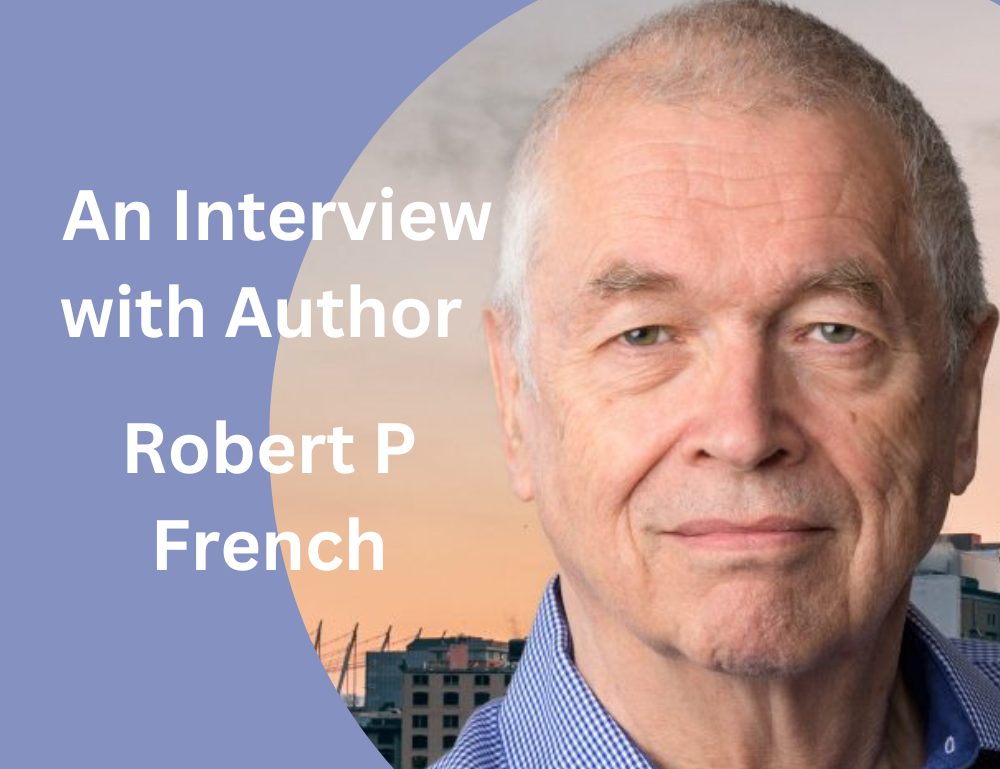I’m a former software developer, former actor, turned author of The Cal Rogan Mystery. I was born in Oxford and now live in my beautiful adopted city of Vancouver. It took me years and many books (partially or unsuccessfully) to learn the craft of a writer. I invite you to enjoy the six mysteries of Cal Rogan. Six days a week you can meet me at the Vancouver Public Library, staring at my computer, working on the next, untitled book in the series.
Here is an interview with Robert P French
Robert P French is a published author. Here is an interview with Robert P French.
Can you tell us a little bit about yourself?
I am Robert P. French author of the gritty Cal Rogan Mysteries. There are seven books in the series so far and I am working on the eighth, as yet untitled.
How many hours a day do you write?
I don’t have a fixed daily schedule but I aim to write for twenty-five hours a week.
How many unpublished and half-finished books do you have?
When I was learning the craft of writing, I started three books and ended up abandoning them. Finally, I completed a book but it was just not good enough for the light of day. Luckily, as part of the process of finishing that book, I met an editor who mentored me through my first and second Cal Rogan books.
How long on average does it take you to write a book?
Six to eight months.
Read: How to start a blog with the most profitable niches?
Where did you get the idea for your recent book?
My most recent book is Jailed. The idea came to me after having read an interesting article about the Innocence Project which helps innocent people get out of jail. They often use DNA evidence to exonerate their clients. I thought it might be interesting for Cal Rogan to try and get an innocent kid out of jail when all the DNA evidence was against him.
How did you develop your plots?
When I get the idea for a book, I use mind-mapping software to create an overview of where I want to book to go. However, I don’t create a chapter-by-chapter plan. I just sit down and start writing and let the plot unfold. As it develops, I update the mind map but I never allow a plan for a book to constrain an interesting plotline that might appear organically as I write. In my first book, Junkie, I didn’t know who the killer was until about seventy percent of the way through the book.
How do you select the names of your characters?
They usually just pop into my head. If the character has a name originating in another country, I look at lists of names for that country until I find one that feels right. If I am writing a character who reminds me of someone I know, I get their permission to use their name.
If you didn’t write, what would you do for work?
Not writing is not an option for me. I am at an age where most people would retire but I intend to write until they have to pry my computer out of my cold dead hands. (To paraphrase Charlton Heston.)
What is your favorite childhood book?
I was an avid reader as a child but I rarely read children’s books. I fell in love with the James Bond books. They made me want to write. However, the book Reach for the Sky, about World War II pilot Douglas Bader had a huge impact on me. Although I didn’t much like the character Bader as described in the book, I had tremendous respect for his power to overcome the tragedy of losing his legs in an accident and his determination in fighting his way back into the pilot’s seat. One of his senior offices, a Wing Commander, once said to him, “Rules are for the obedience of fools and the guidance of the wise.” I love that and have lived my life by it.
Have you read anything that made you think differently about fiction?
Yes. Donald Maas’s excellent book, Writing the Breakout Novel. One of the things he advises is to make sure there is tension on every page. When writing (or reading) I am acutely aware of that rule.
What are you currently working on?
I am working on the next book in the series as yet untitled.
Do you read your book reviews? How do you deal with bad or good ones?
Hardly at all anymore. Bad reviews bothered me at first but now I just don’t care. That said, I did get one bad review that pointed out some serious failings in a book. I corrected the problems and contacted the reviewer to thank her.
What’s your advice for aspiring writers?
Learn the craft, learn the craft and never stop learning the craft. Read Donald Maas’s books. Read Stephen King’s book On Writing. Most importantly, try to find a mentor whose work you admire. I have found that many authors are remarkably generous about helping other writers.
What was the best money you ever spent as a writer?
Paying Nick Castle to design my covers and Bryan Cohen to write the blurbs for my first three books.
What’s the best thing about being a writer?
Emails from my readers. They are what make all the pain worthwhile.
What is your preferred method to have readers get in touch with or follow you?
Through my website robertpfrench.com or on facebook.com/robertpfrenchauthor
What do you want to say about our website?
I love reading how other authors have answered these questions. Everyone has a different take on things. It’s inspiring.

